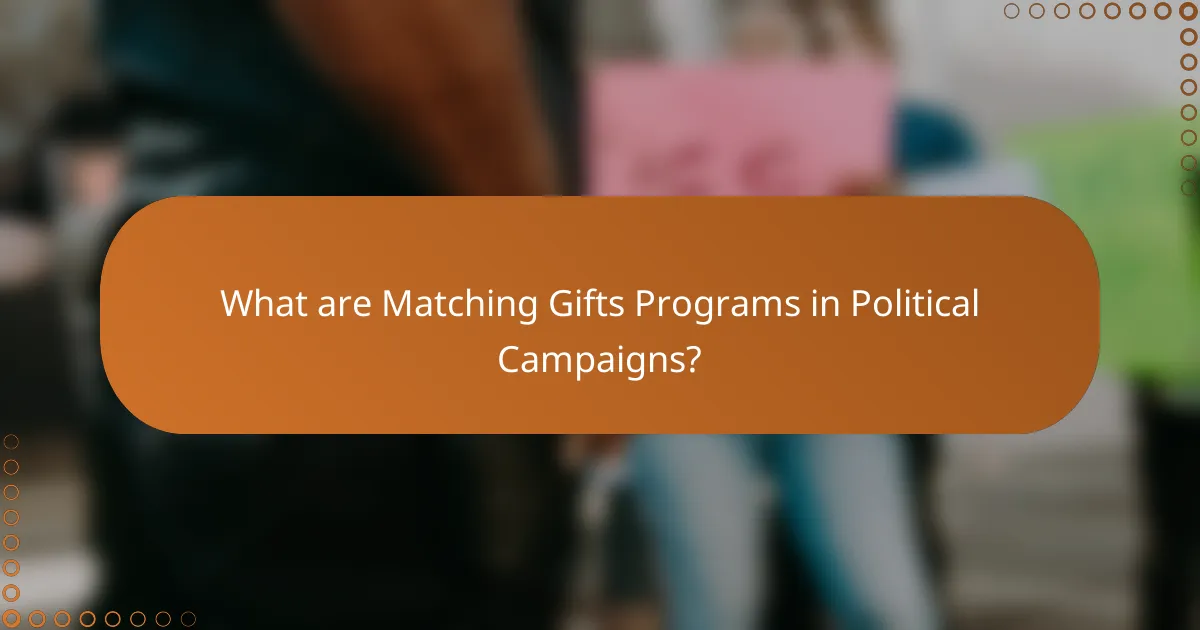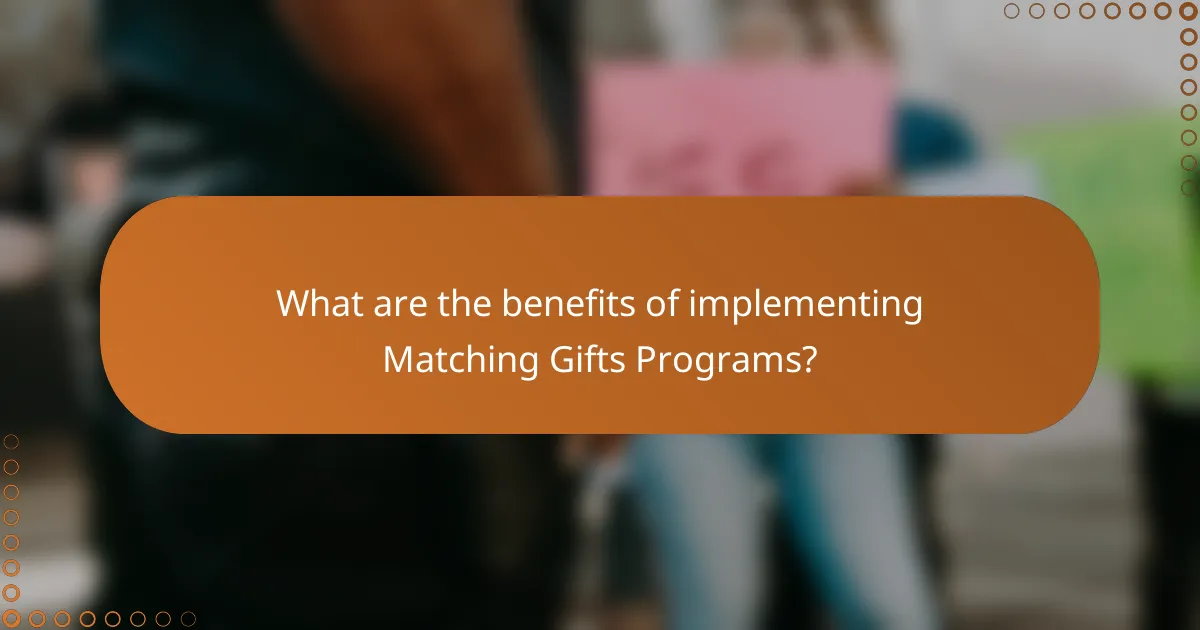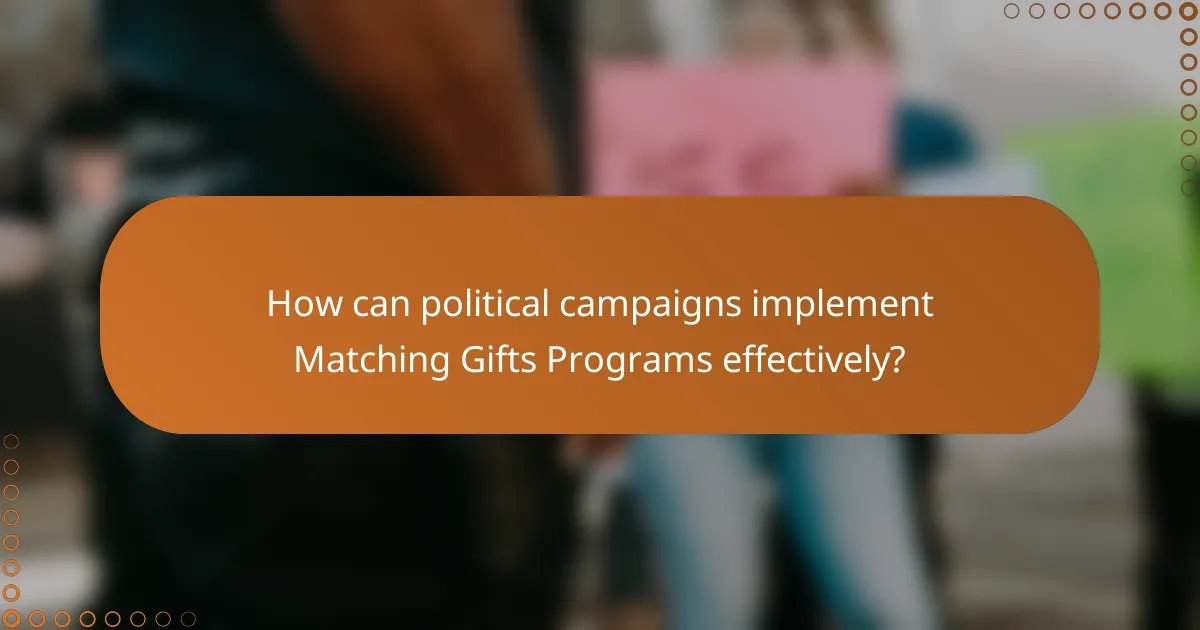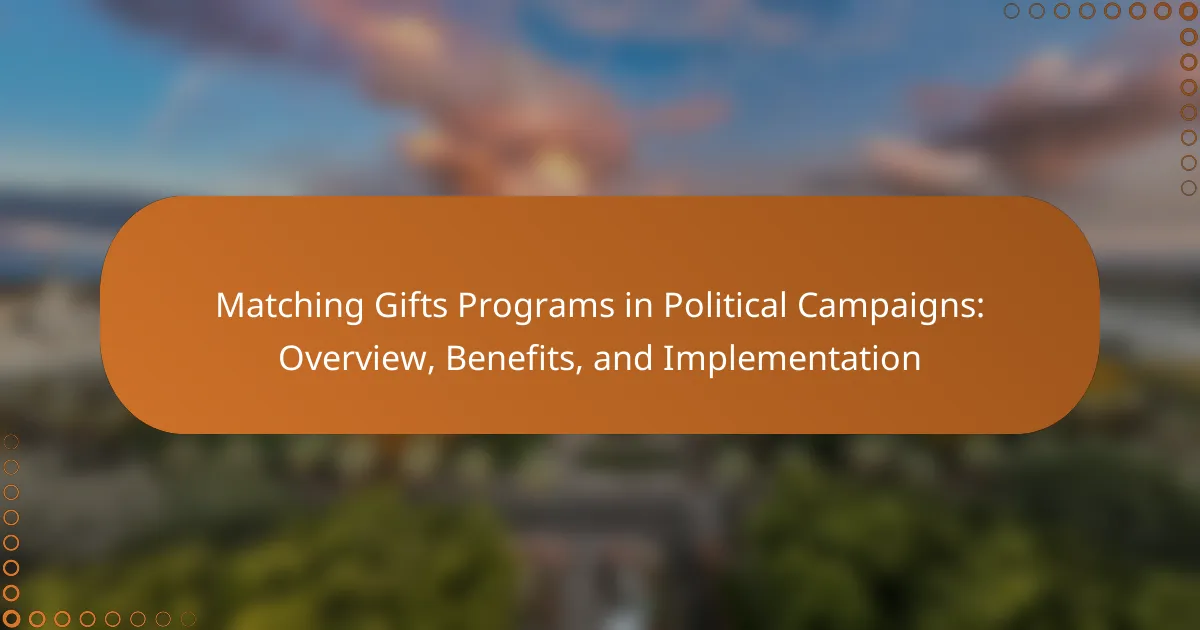Matching Gifts Programs are initiatives in political campaigns where individual donations are matched by third parties, such as corporations or organizations, effectively doubling the financial impact of contributions. These programs enhance fundraising effectiveness by incentivizing donors to give more, as their contributions can be matched, leading to significant increases in overall donations—research indicates potential growth of 1.5 to 3 times. The article will explore the benefits of Matching Gifts Programs, including increased donor engagement and campaign visibility, as well as strategies for effective implementation, such as establishing partnerships with corporate sponsors and clear communication with supporters. Additionally, it will highlight the importance of tracking and acknowledging matched donations to strengthen donor relationships.

What are Matching Gifts Programs in Political Campaigns?
Matching gifts programs in political campaigns are initiatives where donations made by individuals are matched by a third party, often corporations or organizations. These programs incentivize donors to contribute by effectively doubling their financial impact. For example, if a donor gives $100, the matching program may contribute an additional $100. This mechanism increases overall fundraising efficiency. According to research by the Association of Fundraising Professionals, matching gifts can increase donations by up to 200%. Such programs are particularly beneficial in political fundraising, as they amplify donor engagement and support.
How do Matching Gifts Programs function within political campaigns?
Matching Gifts Programs in political campaigns allow donors to increase their contributions through employer matching. When a donor gives to a political campaign, their employer may match that donation, effectively doubling or tripling the total contribution. This incentivizes individuals to donate more, knowing their employer will amplify their support. Many companies have established matching gift policies that apply to political contributions. Campaigns often promote these programs to maximize fundraising potential. Research indicates that campaigns utilizing matching gifts can raise significantly more funds. For instance, a study by the National Philanthropic Trust found that matching gifts can increase total donations by an average of 1.5 times. This mechanism thus enhances the financial viability of political campaigns.
What are the key elements of Matching Gifts Programs?
Matching Gifts Programs are initiatives that encourage donations by matching contributions made by employees. Key elements include employer participation, donation eligibility, and matching ratios. Employers typically set specific criteria for which donations qualify for matching. This often includes limits on the amount that can be matched and the types of organizations eligible for support. Many companies require employees to submit matching gift requests for processing. The programs can significantly increase fundraising efforts. Research indicates that companies with matching gift programs see a 1.5 to 3 times increase in donations. This demonstrates the effectiveness of such programs in enhancing charitable contributions.
How do donors participate in Matching Gifts Programs?
Donors participate in Matching Gifts Programs by making a contribution to a qualifying organization. After donating, they can submit a matching gift request to their employer. Many companies offer matching gift programs to double or triple employee contributions. Donors typically need to provide proof of their donation, such as a receipt. The employer then verifies the donation and processes the matching gift. This process can significantly increase the total funds raised for political campaigns. According to research, matching gifts can increase donations by an average of 1.5 to 3 times the original gift.
Why are Matching Gifts Programs important for political campaigns?
Matching Gifts Programs are important for political campaigns because they significantly increase fundraising potential. These programs encourage donors to contribute more by matching their donations, effectively doubling the impact of each contribution. Research shows that campaigns utilizing matching gifts can raise up to 3 times more than those that do not. This increased funding allows for more extensive outreach and engagement efforts. Additionally, matching gifts can motivate donors to participate, knowing their contributions will be amplified. Such programs also foster a sense of community among supporters, enhancing their commitment to the campaign. Overall, matching gifts are a strategic tool for maximizing financial resources in political campaigns.
What impact do Matching Gifts Programs have on fundraising efforts?
Matching Gifts Programs significantly enhance fundraising efforts. They incentivize donors to contribute by doubling or even tripling their donations. Companies often match employee donations to eligible charities, increasing the total funds raised. This program can lead to a 1:1 match or higher, depending on the employer. Research indicates that organizations utilizing matching gifts can see an increase of 50% or more in donations. Additionally, these programs can attract new donors who are motivated by the matching opportunity. Overall, Matching Gifts Programs create a win-win scenario for both donors and organizations, amplifying the impact of each contribution.
How do these programs enhance donor engagement?
Matching gifts programs enhance donor engagement by incentivizing contributions through employer matching. These programs increase the total funds raised, motivating donors to give more. When donors know their contributions can be doubled, they are more likely to participate. This leads to higher overall donor satisfaction and loyalty. According to a study by Double the Donation, matching gifts can increase donations by up to 1.5 times. Enhanced communication about matching opportunities also keeps donors informed and engaged. Regular updates and recognition of matched gifts foster a sense of community among donors. Ultimately, these programs create a more interactive and rewarding giving experience.

What are the benefits of implementing Matching Gifts Programs?
Matching Gifts Programs increase fundraising effectiveness for political campaigns. They encourage donors to give more, knowing their contributions can be matched by employers. This can potentially double the impact of individual donations. Research indicates that campaigns utilizing matching gifts see a significant increase in overall donations. For instance, organizations report a 1.5 to 3 times increase in funds raised. Additionally, these programs enhance donor engagement and loyalty. Donors feel more valued when their contributions are matched. Implementing such programs can also improve the campaign’s visibility and outreach. This leads to a broader donor base and increased support for the campaign.
How do Matching Gifts Programs increase campaign funding?
Matching Gifts Programs increase campaign funding by incentivizing donors to contribute more. When a donor’s contribution is matched by their employer, it effectively doubles the amount received by the campaign. This encourages donors to give larger gifts, knowing their impact will be amplified. Research shows that campaigns utilizing matching gifts can raise 2-3 times more than those that do not. Additionally, it enhances donor engagement and loyalty, as contributors feel their efforts are recognized and valued. This results in a broader base of support and increased overall contributions.
What statistics support the effectiveness of Matching Gifts Programs?
Matching Gifts Programs significantly enhance fundraising efforts. Research indicates that organizations with matching gift opportunities receive 2 to 3 times more donations. According to a study by Double the Donation, 84% of donors are more likely to give if a matching gift is available. Furthermore, the average donation amount increases by 51% when matching gifts are involved. Companies that offer matching gifts report higher employee engagement in charitable giving. In 2021, the total amount matched by employers reached over $4 billion in the U.S. These statistics demonstrate the positive impact of Matching Gifts Programs on fundraising success.
How do Matching Gifts Programs attract new donors?
Matching Gifts Programs attract new donors by doubling the impact of their contributions. Donors are motivated to give when they know their donations will be matched by their employer. This matching can significantly increase the total funds raised for a campaign. Research shows that campaigns utilizing matching gifts can see a 1.5 to 3 times increase in donations. Additionally, awareness of matching gifts can lead to new donor engagement. Many potential donors may not be aware of their employer’s matching gift program. Thus, campaigns that promote these programs can attract individuals who might not have donated otherwise. By highlighting the benefits of matching gifts, campaigns can create a sense of urgency and community support.
What strategic advantages do Matching Gifts Programs offer?
Matching Gifts Programs provide significant strategic advantages for political campaigns. They enhance fundraising efforts by doubling or even tripling donations made by supporters. This leverage increases the overall financial resources available for campaign activities.
Furthermore, these programs incentivize donors to contribute more, knowing their gifts will be matched. This can lead to higher engagement and loyalty among supporters. Matching Gifts Programs also promote a culture of giving, encouraging others to donate as well.
Additionally, they can improve the visibility of the campaign. When companies match donations, it often results in positive publicity for both the campaign and the corporation involved. According to a study by the Association of Fundraising Professionals, campaigns utilizing matching gifts see a 1.5 to 3 times increase in total donations.
Overall, Matching Gifts Programs strategically amplify fundraising potential, engage supporters, and enhance campaign visibility.
How can campaigns leverage Matching Gifts for greater visibility?
Campaigns can leverage Matching Gifts for greater visibility by promoting the program to their donor base. Highlighting matching gift opportunities can increase donor engagement. Campaigns should provide clear instructions on how to participate in matching gift programs. Utilizing social media and email campaigns can spread awareness effectively. Case studies show that campaigns promoting matching gifts see increased contributions. For example, a study by Double the Donation indicates that 84% of donors are more likely to give if a matching gift is available. Additionally, showcasing matched donations can enhance the campaign’s credibility and attract new supporters.
What role do Matching Gifts Programs play in building long-term relationships with donors?
Matching Gifts Programs enhance long-term relationships with donors by amplifying their contributions. These programs encourage donors to give more, knowing their gifts will be matched by their employers. This creates a sense of partnership between the donor and the organization. Increased donations foster deeper engagement and loyalty. Studies show that organizations utilizing matching gifts see a 1.5 to 3 times increase in donations. This financial incentive motivates donors to remain connected over time. Furthermore, matching gifts programs often involve regular communication, keeping donors informed and involved. This ongoing interaction strengthens the bond between the donor and the organization.

How can political campaigns implement Matching Gifts Programs effectively?
Political campaigns can implement Matching Gifts Programs effectively by establishing partnerships with corporations that offer matching gift incentives. Campaigns should identify potential corporate partners and promote the matching gift opportunities to their supporters. Clear communication about how matching gifts work is essential. Providing easy-to-follow instructions for donors can enhance participation. Campaigns can also use digital platforms to streamline the matching process. Regular reminders about matching gift deadlines can encourage timely contributions. Tracking and acknowledging matched donations strengthens donor relationships. According to a study by Double the Donation, campaigns can see a 200% increase in donations through effective matching gift strategies.
What steps should campaigns take to establish a Matching Gifts Program?
Campaigns should follow structured steps to establish a Matching Gifts Program. First, identify potential corporate partners that offer matching gift programs. Research their specific guidelines and eligibility requirements. Next, create clear messaging to inform donors about the matching gift opportunity. Develop promotional materials that highlight the benefits of matching gifts for both donors and the campaign. Implement an easy process for donors to submit their matching gift requests. Monitor and track the contributions received through the program. Finally, acknowledge and thank both the donors and the corporate partners for their support. These steps enhance fundraising efforts and engage supporters effectively.
What resources are necessary for setting up a Matching Gifts Program?
To set up a Matching Gifts Program, organizations need several key resources. First, they require a robust database to track donations and match eligible contributions. This system should integrate with existing fundraising platforms. Second, organizations need clear guidelines outlining eligibility criteria for matching gifts. These guidelines help ensure transparency and compliance. Third, marketing materials are essential to promote the program to potential donors. Effective communication strategies can increase participation rates. Additionally, staff training is necessary to educate team members about the program’s details and processes. Finally, partnerships with companies that offer matching gift programs can enhance the initiative’s reach and effectiveness.
How can campaigns communicate the program to potential donors?
Campaigns can communicate the program to potential donors through targeted messaging. Clear and concise information about matching gift programs should be shared. Campaigns can utilize email newsletters to inform existing supporters. Social media platforms can engage a wider audience with compelling visuals and stories. Informational webinars can provide in-depth explanations of the program’s benefits. Direct mail campaigns can reach donors who prefer traditional communication methods. Personal outreach from campaign staff can enhance relationships and clarify details. According to a 2021 survey by Double the Donation, 78% of donors are more likely to give if they know their contribution will be matched.
What common challenges do campaigns face with Matching Gifts Programs?
Campaigns face several common challenges with Matching Gifts Programs. One challenge is the lack of awareness among donors about matching gift opportunities. Many donors do not know their employers offer matching gifts. This can lead to missed fundraising potential. Another challenge is the complexity of the matching gift process. Different companies have varying rules and requirements for matching gifts. This can create confusion for both donors and campaign staff. Additionally, campaigns often struggle with tracking and verifying matching gifts. Accurate record-keeping is essential for successful implementation. Lastly, limited resources can hinder campaigns from effectively promoting matching gift programs. Many campaigns lack the staff or budget to educate and engage donors about these opportunities.
How can campaigns overcome obstacles in donor participation?
Campaigns can overcome obstacles in donor participation by enhancing communication and engagement strategies. Effective outreach helps to build trust and transparency with potential donors. Personalizing messages increases the likelihood of participation. Providing clear information about the impact of donations motivates potential donors. Simplifying the donation process reduces barriers to participation. Regular updates on campaign progress keep donors informed and engaged. Utilizing social proof, such as testimonials from existing donors, can encourage new participation. Research indicates that campaigns with strong donor engagement strategies see a 30% increase in participation rates.
What are best practices for managing Matching Gifts Programs?
Best practices for managing Matching Gifts Programs include clear communication with donors about the program’s details. Organizations should provide easy access to matching gift information through their websites. Regularly updating donors about their matching gift eligibility can enhance participation. Tracking and acknowledging matched donations promptly is essential for donor satisfaction. Utilizing technology to automate the matching gift process can increase efficiency. Training staff on matching gift procedures ensures consistency in management. Lastly, building relationships with companies that offer matching gifts can lead to increased funding opportunities.
What tips can enhance the success of Matching Gifts Programs in campaigns?
To enhance the success of Matching Gifts Programs in campaigns, organizations should effectively communicate the program’s details to their donors. Clear messaging about how matching gifts work can increase participation. Organizations should also provide easy access to information about eligible employers and the matching process. Simplifying the submission process for donors can lead to higher engagement. Additionally, promoting matching gifts during fundraising events can encourage immediate contributions. Regular reminders about matching gift opportunities can keep the program top of mind for donors. Finally, showcasing the impact of matched donations can motivate further contributions. Research shows that campaigns with clear matching gift strategies can increase overall fundraising by up to 50%.
Matching Gifts Programs are initiatives in political campaigns that allow donors’ contributions to be matched by a third party, typically their employers, effectively doubling or tripling the financial impact of each donation. This article provides an overview of how these programs function, their importance in enhancing fundraising efforts, and their role in increasing donor engagement and loyalty. Key elements, implementation strategies, and best practices for successfully managing Matching Gifts Programs are discussed, alongside statistical evidence supporting their effectiveness in boosting campaign funding. Additionally, common challenges faced by campaigns and tips for overcoming obstacles in donor participation are highlighted.
